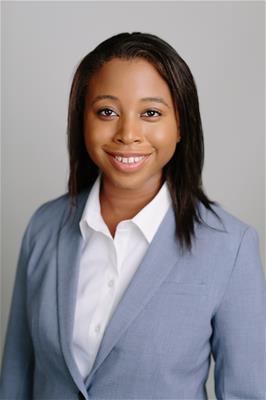Sep 15, 2022
One nation, slightly divisible — exploring race and gender inequity in America
If you could pay to ensure that the person reviewing your job application didn’t know your gender, would you? And if so, why? Those are a few of the key questions that Gies assistant professor Mackenzie Alston recently examined in research exploring perceptions of discrimination in hiring.
 Every year, thousands of job seekers fail to secure the job of their dreams, not because they failed their interview, but because they failed to apply. Alston theorized that this tendency toward self-selection had something to do with perceptions of discrimination that might keep women from applying to jobs in male-dominated fields and vice versa. So, she devised a simple way to find out, running an experiment in which participants in a simulated job market were asked how much they would be willing to pay to have all of the participants’ genders either revealed or hidden. “The idea being that, if you don’t think that gender has any role in the hiring decision, then you’re not going to pay to either hide or reveal that information, because it doesn’t matter,” said Alston.
Every year, thousands of job seekers fail to secure the job of their dreams, not because they failed their interview, but because they failed to apply. Alston theorized that this tendency toward self-selection had something to do with perceptions of discrimination that might keep women from applying to jobs in male-dominated fields and vice versa. So, she devised a simple way to find out, running an experiment in which participants in a simulated job market were asked how much they would be willing to pay to have all of the participants’ genders either revealed or hidden. “The idea being that, if you don’t think that gender has any role in the hiring decision, then you’re not going to pay to either hide or reveal that information, because it doesn’t matter,” said Alston.
In this experiment, participants built a simplified resume and then completed a short sports trivia quiz. After the quiz, they were told that their resume would be matched with the resume of a participant of the opposite sex who performed similarly as well, and both resumes would be sent to a third party who would act as a hiring manager. This hiring manager would pick one of them to hire. Before that choice was made, participants were asked how much they would pay to ensure that the genders on both applications were either hidden or revealed. And the results were largely what you might expect.
“Basically, men were more interested in paying to have their gender revealed than to have it hidden, and the reverse was true for women,” said Alston. “That seemed to suggest that both thought that managers would be more inclined to choose men over women, even though their resumes were similar.” Interestingly, she also tested for manager bias in the same experiment and concluded that men tend to overestimate that bias, implying that they believe that their gender gives them an advantage.
Alston, whose research interests include experimental and behavioral economics, says most of her work focuses on discrimination and disparities. “At the moment, I’m particularly interested in racial and gender differences,” she said. “I think it’s interesting to study how different people have different life experiences and how that can affect their well-being, their utility, and their life outcomes.”
In another study, Alston explored how the social justice movement and the ways in which tensions over George Floyd’s death in 2020 impacted minority faculty members. “What we found, unsurprisingly, was that Black faculty expressed a more negative effect on both their ability to do research and their ability to teach.” Many of those faculty focused their time on community service, which Alston believes could have unintended consequences.
“When you look at what universities value when it comes to promotion and tenure, most of the weight is put on research and/or teaching,” said Alston. “So if Black faculty dedicate more of their time to service, and that’s not rewarded proportionately, it could create imbalance and inequities on top of the problems already there in academia and the underrepresentation that exists.”
Alston, who earned a PhD in economics at Texas A&M University, joins Gies from Florida State University, where she was an assistant professor of economics. Alston says her decision to join Gies was prompted by a conversation with David Molitor, an associate professor of finance at Gies and someone she knew from her graduate studies in Texas. “He let me know that there might be an opening in the finance department, and things went from there.” With her focus on identity and diversity, Alston felt she had something unique to bring to the program. And she was also excited about the idea of teaching and mentoring students at Gies.
Alston, who will be leading a methodology class on surveys and experiments for grad students, says her love of teaching comes from a professor whom she admired from college. She also draws inspiration from her parents, who both hold graduate degrees. Her dad is the financial director of financial planning and analysis at SC Johnson and is partially responsible for her love of quantitative analysis. Her mother was a professor in English at Milwaukee Area Technical College and introduced her to what life is like as a professor. As a teacher, Alston says she enjoys helping students connect the dots, and she looks forward to getting to know all of those in her class. “I feel like they’re a big reason why I’m in academia in the first place. Knowing that I have some impact on their lives — even if it’s just for one semester — is a strong motivation for me.”
